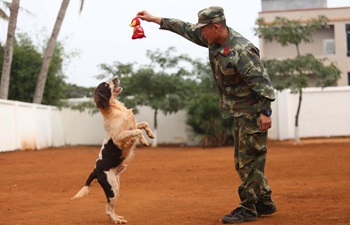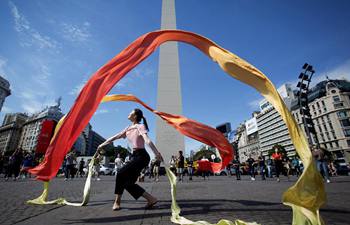ANKARA, Feb. 10 (Xinhua) -- U.S. Secretary of State Rex Tillerson and National Security Adviser H.R. McMaster will visit Turkey on separate crucial trips in the upcoming days, amid strained relations between the two countries over Turkish ongoing cross border operation in Syria.
Tillerson's trip to the region is also set to take him to Jordan, Kuwait, Egypt and Lebanon.
Officials in Ankara said McMaster was expected to arrive in Turkey at the weekend, and Tillerson on Tuesday. Both officials will meet with the Turkish leadership.
Meanwhile, U.S. Secretary of Defense James Mattis is due to meet his Turkish counterpart Nurettin Canikli next week in Brussels to discuss Syrian issue, amid a huge amount of high-level activity between Turkey and the United States.
"These visits are important because we are in efforts to rebuild trust with the U.S.," said on Thursday Ibrahim Kalin, Turkish Presidential spokesperson. "These are in fact concrete steps to be taken by the U.S. to provide this trust," he added.
TURKISH AFRIN OPERATION ON AGENDA
The trips will focus on Ankara's intervention in the northern Syrian of Afrin, where Turkish troops are targeting U.S.-backed Kurdish forces, the People's Protection Units (YPG), instrumental in defeating the Islamic State (IS) in Syria.
Relations between Washington and Ankara, close NATO allies since 1952, have been highly strained, in part due to U.S. support for the YPG in Syria. Turkey sees the YPG as Syrian offshoot of the Kurdistan Workers' Party (PKK), which is designated as a terrorist group by Turkey, the United States and the EU.
"Our trust is damaged. We have to mend our trust. The contacts between us are important," Turkish Foreign Minister Mevlut Cavusoglu said in an interview with TGRT Haber.
"When Tillerson comes we will share these ideas with him sincerely, we will share our expectations," he said.
With the Turkish "Operation Olive Branch" in its third week, the United States has raised questions over Turkey's lack of clarity on the goals of the offensive.
Ankara has claimed the campaign jointly conducted with Syrian Rebels is also targeting IS.
The YPG also controls the key strategic town of Manbij to the east, located about 100 km from Afrin, and then a long strip of territory east of the Euphrates up to the Iraqi border.
With the YPG a key ally of Washington in the battle against the IS group, the Turkish campaign has seen the two NATO partners on opposite ends of the spectrum with a possible risk of direct conflict.
Two senior U.S. generals have visited Manbij on Wednesday with outsized U.S. flags on their vehicles, and one of them said: "You hit us, we'll respond aggressively," in response to Turkish threats, according to U.S. reports, clearly a sign of mounting tensions on the war terrain.
Meanwhile, Cavusoglu said "the United States should understand and meet our concerns."
"You are cooperating with this terror organization, knowingly. And this poses a threat to us," he added.
ANKARA VOWS TO EXPAND ITS OFFENSIVE
On Sunday, Turkey threatened to expand its military operations against Kurdish militia in the Syrian town of Manbij, warning that U.S. troops employed there risk being targeted if they wore enemy uniform.
Washington said it wanted to continue the fight against IS and to create a bulwark against Iranian influence in Syria and Iraq. But on the other hand, Turkey wants to cooperate with Tehran in order to prevent any mistrust with its eastern neighbor, also militarily involved in the Syrian crisis alongside the Syrian regime as President Bashar al-Assad's ally.
During a telephone conversation on Thursday, Turkish President Recep Tayyip Erdogan and his Russian counterpart Vladimir Putin have agreed to hold their next Syria summit among Turkey, Russia and Iran in Istanbul, said Turkish sources.
The previous summit was held in the Russian Black Sea city of Sochi on Nov. 22.
On Thursday, Erdogan promised to widen revenue with the ongoing Turkish military operation, promising to take it also to Idlib province after completing the current mission in Afrin, without elaborating.
Turkey is currently deploying observation points in Idlib in accordance with Russia and in line with the Astana agreement.
Two Turkish civilian workers and a Turkish soldier have been killed in enemy fire in Idlib during this process.
The Turkish president insisted that the operation in northern Syria intends to secure Turkey's southern border strip of "terrorist threat" and help the return of some 3.5 millions of displaced Syrians that it is hosting.
According to a latest toll announced by the Turkish Armed Forces, nearly 1,100 YPG fighters have been killed in clashes.
Experts in both sides believe that the deterioration of relations are in neither country's interest.
"At the end Turkey and the United States need each other in several fields, not only security or Syria. I personally do not think that there will be a direct conflict between the two countries troops in Syria, a diplomatic way will be found to avert it, even though there are statements raising the stakes," said Oytun Orhan, an expert from the Ankara-based think tank, Center of Middle Eastern Strategic Studies.
The Syrian war is not the only contention in bilateral ties and Turkish-U.S. ties have neared a breaking point over a number of issues, including the U.S.-exiled cleric Fethullah Gulen, accused by Ankara of masterminding a 2016 botched military coup.
Washington has until now refused to extradite the cleric, infuriating Erdogan and his administration.
"Whenever we meet with American authorities, here or Washington, we emphasize the need for the U.S. to extradite this individual for the good of the future of our relations," a source close to the Turkish government said to Xinhua.
"As long as this fugitive stays in the U.S., we won't be able to fully mend our ties," he added, reminding that 200 people were killed in the failed coup and that Gulen had to face the Turkish justice for his crimes.
Last but not least, there is also last month's U.S. conviction of an executive from Turkey's state-owned Halkbank over helping Iran evade U.S. sanctions.
"Let's say it clearly without beating around the bush: Turkey and the U.S. are now foes rather than partners. Their relationship is spiraling downward in an unprecedented manner," wrote prominent Turkish commentator Sedat Ergin in his column in Hurriyet daily on the eve of the U.S. officials' visit.
He added that "the crisis is bound to escalate even further" in the light of the harsh rhetoric of the Turkish government and the offensive of the Turkish army in Syria.

















